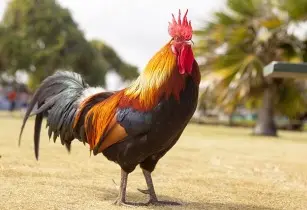Representatives from Burkina Faso and Mali presented the advantages of investing in their agricultural industries in an interactive session at VIV Europe
Amoussa Aziz, representing Agence Burkinabe des Investissements, said Burkina Faso's central location in West Africa was appealing, along with a growing economy - GDP is currently at $US4.628bn or $US649.73 per capita, with inflation at just 1 per cent and average annual growth at 5.9 per cent, based on 2016 figures.
Mr Aziz said that cotton production was a major part of the Burkina Faso agricultural industry, along with the production of dried mangoes, livestock breeding, vegetable growing (second-largest in West Africa), onion exporting (second largest in West Africa and sesame exports (eighth largest in the world). He added that the climate in Burkina Faso is favourable for agriculture.
In regard to poultry, Mr Aziz said the country produced hen, guinea fowl, duck, turkey and pigeon, with breeding making up 28.6 per cent of GDP and 25 per cent of export receipts after gold and cotton. However, there are investment opportunities in terms of modernising Burkina Faso's poultry industry with 95 per cent of farmers still using traditional methods. In particular, he cited modern broiler and egg farming as requiring investment, as well as modern breeding equipment, livestock health, cold chain innovations, packaging solutions and organic certification. In the feed sector, he said there are opportunities for investment for cattle and chicken nutrition.
Financial incentives included a choice of investment schemes with tax holidays depending on the size of investment and the number of people employed. Mr Aziz also said foreign investors have the same protection rights as local investors, freedom to transfer funds and income and easy access to currencies at market rates.
Like Burkina Faso, Mali is a leading cotton producer. In her presentation at VIV Europe, Binta Diakite, promotion officer, Investment Promotion Agency of Mali, said the country has "viable opportunities, great potential and a business-friendly government". In tandem with Burkina Faso, Mrs Diakite said that Mali also offers foreign investors the same rights as locals, such as protection from expropriation, companies can be 100 per cent foreign-owned, repatriation of funds is easy, a wide range of tax holidays on offer, and there are good dispute resolution mechanisms in place. Mali's Law of Agricultural Orientation has a strong focus on sustainable development, land management obligations and agricultural research provisions, according to Mrs Diakite.
Mali still has a very traditional poultry sector, with 40.4mn birds farmed by traditional methods in 2017 compared with 6.1mn by modern methods.
Mrs Diakite told the conference that overall poultry opportunities in Mali include slaughter, distribution, feed, egg processing and packaging, and animal health services and products. The mining sector is also getting involved in agriculture as a means of sustaining businesses after mines close down, such as Morila, a gold mining business currently looking for partners to operate their poultry farming activities. This includes specifically day-old chicks, egg production, compost, broilers, tray production, feed manufacturing, mayonnaise production and logistics.





